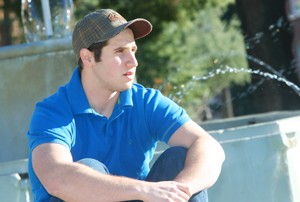A “”time for giving”” takes on a greater meaning for two brothers this holiday season.
On Thursday morning, psychology junior Daniel Sher will undergo surgery at University Medical Center to give his brother a kidney.
Sher, who is not biologically related to his older brother, has type O blood and is a perfect match with him.
It started about a year and a half ago, when Michael, Daniel’s 21-year-old brother who is visually impaired, came back from a living skills program in Northern California in order to develop skills to live on his own.
He was not utilizing those skills when he got home, which did not arouse much suspicion initially. It wasn’t until receiving the results of his blood work from a physical checkup that the family realized what was wrong: Michael’s kidneys had stopped functioning properly.
A year later in June, Daniel decided to go to his father’s pediatric office and get some blood work done. The following morning, he received a phone call saying Michael’s kidneys had failed. It was later discovered that he was suffering from multicystic kidney failure.
Michael’s diet immediately changed. He was restricted from eating an excess of protein, sodium, phosphates and carbohydrates. He even had to prepare to go on a dialysis machine.
He eventually went on peritoneal dialysis, a blood cleansing method done through the abdomen. A bag is embedded into the abdominal cavity, which allows the abdominal tissue lining to filter the blood and capture it into the bag.
“”Once he had the surgery to put the dialysis lining in, it takes about month before you can use it,”” said Randi Sher, Daniel’s mother.
Michael hooks himself up to the machine for 10 hours a night, seven days a week – which pumps 6 liters of fluid per session.
Blood tests showed that Michael’s creatinine levels were extremely high, which explained his lack of performance a year earlier when he had just returned from the living skills program.
“”He wasn’t as funny as he used to be, or as outgoing as he used to be, because the creatinine levels had mellowed him out and had clouded his thought process,”” Daniel said.
Daniel decided then that he wanted to help his brother and started testing to become a donor.
“”You can live life very fully with one kidney,”” he said.
Daniel and Michael are only 14 months apart in age and have a close relationship. Daniel explained that in his family, when someone is in need of help, there are no questions asked, and everyone is always there for the other.
“”It’s my brother,”” Daniel said. “”It’s not something I’m doing because it’s great. It’s family, and so I started getting testing done.””
The testing began with blood work – 15 bottles of it – to make sure the blood would fuse together. If the blood fuses, the kidney can function.
Daniel then had to go in for an overall examination, which checked his weight and cholesterol to make sure his body was in optimum shape.
“”Kids’ bodies develop until they’re about 25,”” said father Larry Sher. “”They’re not done developing; these things are skewed.””
Daniel’s urinary samples at first showed to have higher than normal blood cell count levels.
“”So my dad sent me back to Arizona with a bottle of pee sticks, and I tested my pee till the numbers came out right,”” Daniel said.
Daniel lost 12 pounds, as advised by his physician, and was told that the two bodies would work after the last blood fusion.
Daniel said school has been affected by this whole process. He has flown back and forth four times for surgery related procedures.
“”It’s helped me with my flying miles, but that’s pretty much it,”” he said.
The surgical process has changed over the years, Daniel said. The procedure will be a laparoscopic surgery, where four little holes will be made in his chest with cameras and tools inside. Only at the last second will they make an incision under his belt line and remove the kidney.
After surgery, Daniel cannot drive for two weeks or exercise for six to eight weeks, but he should be able to leave the hospital the following morning.
Michael should recover in a week, but will have to be on medication his whole life and will have to be more cautious of his surroundings and his diet.
“”I’m a doctor’s kid, so I trust surgeons,”” Daniel said.









